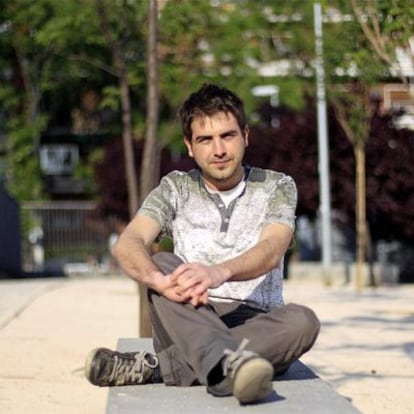The human face of unemployment
Under-25s: "I have never seen a 1,000-euro paycheck in my life"
Out of work before they have even started down the road of employment. The latest government figures show that in the first quarter of this year, 45 percent of under-25s were jobless; equivalent to 860,000 people.
At the end of 2007, when the crisis began, the figure was less than 18 percent.
Tomás Muñoz is a typical example of how hard it is to find work, even for university graduates. Aged 25, and a graduate in journalism, he has spent his short working life either as an intern or on short-term contracts.
But now even those options are denied to him, and he is out of work.
He says that he found his last job after sending out "200 CVs, and I only got one reply." Up until a year ago, he says that he was at least being called to interviews. "But now it looks as though companies are not even bothering to organize selection processes." He says that work isn't just about his career; at this point in his life, it is about bringing in money to pay the rent on the tiny apartment he shares with three others.
Muñoz began his undergraduate studies in Alicante, and then moved to Madrid last September to complete them at the privately run Carlos III University. "I have always worked while I study," he says, adding: "I have no choice."
Like many of his generation, he has realized that a university degree is no guarantee of a job. "When you go to university, you develop very high expectations, and then you leave and get a reality check," he says. His has been a particularly harsh introduction to the realities of life: his career plans have been cut short for the moment by the crisis that began toward the end of 2007. He says that he is not even able to earn 1,000 euros a month. "People use the term mileurista, but it makes me laugh. I have never earned that much money in a month in my life," he says bitterly, adding that all his friends are in the same boat.
When the crisis began, Spain's under-25 unemployment rate was below 18 percent. Almost four years later, it is more than double that. The current 45 percent of under-25s without work represents a 2.5-percent increase on the previous quarter at the end of 2010.
"We're not going to be able to do anything about the situation on our own, we need a collective solution to turn things round," he says. He is a member of the Juventud sin futuro (Youth without a future) platform, which is made up largely of university graduates, and which called a meeting in Madrid on April 7 to draw attention to the problems facing young people under the banner: "no home, no work, no future, no fear."
"We need to politicize the problem, and make our parties more aware of what needs to be done," he adds. "We are the generation that will never become homeowners, yet we look around and see thousands of empty properties," he says.
But Muñoz says that simply creating jobs at any cost isn't enough, and that the traditional instability of Spain's labor market has to be addressed. "The problem is that even when you find a job, you have to work twice as much for half the money in the hope of holding on to your position."

Tu suscripción se está usando en otro dispositivo
¿Quieres añadir otro usuario a tu suscripción?
Si continúas leyendo en este dispositivo, no se podrá leer en el otro.
FlechaTu suscripción se está usando en otro dispositivo y solo puedes acceder a EL PAÍS desde un dispositivo a la vez.
Si quieres compartir tu cuenta, cambia tu suscripción a la modalidad Premium, así podrás añadir otro usuario. Cada uno accederá con su propia cuenta de email, lo que os permitirá personalizar vuestra experiencia en EL PAÍS.
¿Tienes una suscripción de empresa? Accede aquí para contratar más cuentas.
En el caso de no saber quién está usando tu cuenta, te recomendamos cambiar tu contraseña aquí.
Si decides continuar compartiendo tu cuenta, este mensaje se mostrará en tu dispositivo y en el de la otra persona que está usando tu cuenta de forma indefinida, afectando a tu experiencia de lectura. Puedes consultar aquí los términos y condiciones de la suscripción digital.








































